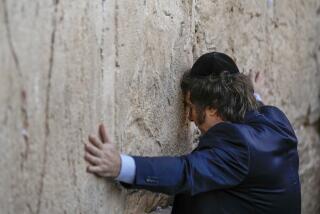Argentine Military’s Change of Mission a Sign of the Times
- Share via
BUENOS AIRES — The most tangible symbol that Argentina has moved into a new era may be at a 4,000-acre compound on the outskirts of town that was once strictly off limits. A billboard used to warn: “Do not park, do not stop, or soldiers will shoot.”
Today, however, the beige barracks off Entrance No. 4 at Campo de Mayo, Argentina’s largest military base, are home to the new International Peacekeeping Academy. And anyone is welcome.
“This is a growth industry,” boasts Col. Fernando Alberto Isturiz, founding commander of the academy, which opened in June. “This is where we teach soldiers and officers how not to use force.”
Argentina, once known as “the land of the generals,” is now the South American continent’s most active U.N. peacekeeper, with recent, ongoing or upcoming contingents in Bosnia-Herzegovina, Cambodia, Haiti, Kuwait, Mozambique, Angola and Western Sahara.
Given the continent’s turbulent military history over the past century, the birth of Argentina’s peacekeeping academy underscores a development as pivotal as democratization and economic reforms. Most of Latin America is also now being demilitarized.
“Argentina is setting an example for the world,” said U.S. Secretary of State Warren Christopher on Thursday as he reviewed the academy’s latest graduates, all bound for U.N. peacekeeping duty in the Balkans. “You’re demonstrating that soldiers can play an indispensable and honorable role in a nation that has embraced civilian democratic government and made peace with its neighbors.
“The transformation of the Argentine military is at the heart of Argentina’s transformation into a stable modern democracy.”
In a somewhat ironic twist, the world’s mightiest military power is promoting, aiding, funding and providing incentives for shifts in the balance of power from Latin America’s once nearly omnipotent armies to still-fledgling civilian governments.
It is one of the quieter U.S. foreign policy objectives. “The Latin Americans don’t like the word ‘demilitarization.’ It makes them sound as if they can’t defend themselves anymore,” said a senior official traveling with Christopher.
So U.S. efforts take some unusual twists. After reviewing the peacekeeping troops, for example, Christopher and Foreign Minister Guido di Tella signed an agreement on U.S.-Argentine cooperation on space exploration and nuclear energy.
The space cooperation will allow Argentina to make peaceful use of technology it developed while making the Condor missile, a program the military has now abandoned. The nuclear-energy deal will also tap Argentine expertise: The country tried to develop a nuclear weapon but abandoned the attempt when it signed the Nuclear Non-Proliferation Treaty last year.
Christopher will sign a similar agreement with Brazil, which developed similar technology--ironically, once largely due to tension with Argentina. And with the continent fully democratic for the first time, neither faces a significant military threat.
With the exception of Andean nations, which still have strong militaries to deal with the growing narcotics trade and the region’s last domestic guerrilla movements, the trend to demilitarize has now taken off everywhere, U.S. officials say. It’s now one of the region’s great success stories.
“Until a couple of years ago, we weren’t sure if the age of the military was really over. But as more and more troops have either gone back to their barracks or been phased out, the trend now seems irreversible,” said the senior U.S. official.
In El Salvador, more than 65% of the army has been demobilized, again with U.S. help. Up to one-third of $600 million in U.S. aid has been involved in downsizing the army and retraining troops in everything from agriculture to business management.
Guatemala has demobilized thousands since the peace process began in 1993, even though the war is not completely over.
In Panama, the army has been eliminated since the United States’ Operation Just Cause ousted strongman Gen. Manuel A. Noriega in 1989. Washington has helped create and train police forces to assume many of the duties once delegated to the military. More than $20 million in U.S. funds is scheduled to go into Panama’s new police force.
Troops from Chile, which until 1990 was ruled by Gen. Augusto Pinochet’s military dictatorship, now serve in U.N. peacekeeping missions in Kuwait, Cambodia, Israel and Kashmir.
The most far-reaching change in South America has been in Argentina, where military spending was slashed by about 75% between the mid-1980s and mid-1990s, leaving the continent’s second-largest country with one of the smallest defense budgets.
Under President Carlos Menem, who was imprisoned for five years during military rule, the number of generals has also been halved and the number of soldiers cut by 80%--to a mere 20,000.
Mandatory military service was eliminated in 1994.
In 1995, women were allowed to enlist for the first time; they’re wanted for several aspects of peacekeeping duty.
Between 1930 and 1983, Argentina’s military ousted six elected presidents and selected 13 of 22 leaders; the nation was either ruled by the military or threatened by it.
Even after the 1983 return to civilian rule, the army attempted three times to oust democratically elected President Raoul Alfonsin.
Today, however, the army is too small, too weak and too poor to be a danger to the civilian government. Its priorities are also elsewhere.
More to Read
Sign up for Essential California
The most important California stories and recommendations in your inbox every morning.
You may occasionally receive promotional content from the Los Angeles Times.













